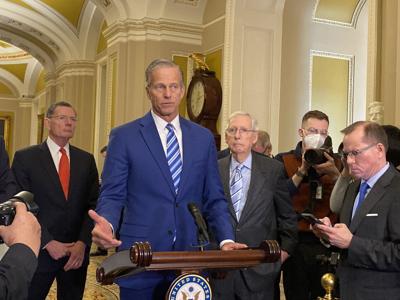The “Big Beautiful Bill” — a centerpiece of President Trump’s domestic agenda — includes nearly $1 trillion in Medicaid reductions over ten years.
In a dramatic turn for U.S. healthcare policy, the “Big Beautiful Bill” — President Trump’s sweeping domestic policy and tax cut package — has advanced through the Senate, setting the stage for the most significant Medicaid cuts in the program’s history. With a self-imposed July 4 deadline looming, the bill’s fate now hangs in the balance as the House prepares for a contentious vote. The Medicaid provisions in the “Big Beautiful Bill” have sparked fierce debate, with millions of Americans’ health coverage at risk and the future of the nation’s safety net on the line.
Key Point Summary
- Senate passes the “Big Beautiful Bill” with unprecedented Medicaid cuts, moving to the House for final approval.
- Nearly $1 trillion in Medicaid reductions projected over the next decade.
- Up to 12 million Americans could lose health coverage by 2034 if the bill becomes law.
- Major new work requirements and eligibility checks set to reshape Medicaid access.
- 1.4 million undocumented immigrants would be removed from Medicaid rolls.
- The bill’s impact extends to Medicaid expansion under the ACA and millions of low-income families.
Senate Approves Historic Medicaid Cuts in the Big Beautiful Bill
On July 1, Senate Republicans passed the largest Medicaid cuts since the program’s creation in the 1960s. The “Big Beautiful Bill” — a centerpiece of President Trump’s domestic agenda — includes nearly $1 trillion in Medicaid reductions over ten years. According to the nonpartisan Congressional Budget Office (CBO), these cuts could result in 11.8 to 12 million Americans losing their health insurance by 2034. The bill, which also features tax breaks and enhanced immigration enforcement, must now clear the House, where moderate Republicans are voicing concerns about the scale of the cuts.
The legislation’s Medicaid provisions are designed to offset the bill’s $3 trillion in new tax cuts and spending. While President Trump and his allies insist that only “waste, fraud, and abuse” will be eliminated, health policy experts warn that the cuts will directly impact millions of low-income Americans, including children, people with disabilities, and seniors. The bill’s supporters argue that the changes are necessary to ensure the program’s long-term sustainability and to prioritize U.S. citizens and legal residents.
Big Beautiful Bill Medicaid Work Requirements: Who’s Affected?
A central feature of the “Big Beautiful Bill” is the introduction of strict Medicaid work requirements. Under both the House and Senate versions, adults aged 19 to 64 in the Medicaid expansion group must prove they are working, training, studying, or volunteering for at least 80 hours per month. These requirements will be enforced through biannual eligibility checks starting January 1, 2027, with some states allowed to implement them earlier.
Key details of the work requirement provisions:
- States must verify work or exemption status at application and renewal, with the option for more frequent checks.
- The House bill exempts parents with children under 18; the Senate version lowers the cutoff to parents with children under 15.
- No exemptions are provided for caregivers of elderly relatives.
- The CBO estimates that these work requirements alone will result in 4.8 million people losing Medicaid coverage over ten years.
Georgia’s recent experience with similar requirements highlights the challenges: technical glitches and difficulties verifying employment, especially for those in informal jobs, led to thousands losing coverage without a corresponding increase in employment.
Table: Medicaid Work Requirement Comparison
| Provision | House Bill | Senate Bill |
|---|---|---|
| Work hours required | 80/month | 80/month |
| Parent exemption | Children under 18 | Children under 15 |
| Caregiver exemption | None for elderly relatives | None for elderly relatives |
| Verification frequency | At application/renewal | At application/renewal |
| Implementation date | Dec 31, 2026 (earliest) | Dec 31, 2026 (earliest) |
Big Beautiful Bill Medicaid and Immigration: 1.4 Million to Lose Coverage
In a move that has drawn intense scrutiny, the “Big Beautiful Bill” includes a provision to remove 1.4 million undocumented immigrants from Medicaid. White House Press Secretary Karoline Leavitt confirmed this measure, stating it is intended to restore Medicaid access to U.S. citizens and legal residents. Supporters frame this as a necessary reform, while critics argue it is a politically motivated attack that will leave vulnerable people without care.
Impact on Medicaid Expansion and the ACA
The “Big Beautiful Bill” also targets Medicaid expansion under the Affordable Care Act (ACA). As of June 2024, over 20 million people are enrolled through Medicaid expansion, making up nearly a quarter of total Medicaid enrollment. The bill’s changes would make it harder for adults without dependents, as well as many parents and people with chronic conditions, to retain coverage.
- States could impose stricter requirements than the federal minimums, potentially increasing the number of people at risk of losing coverage.
- The bill’s aggressive timeline gives states limited time to overhaul their systems and implement new verification protocols.
What’s Next for the Big Beautiful Bill Medicaid Provisions?
The House is set to deliberate on the Senate-passed version of the “Big Beautiful Bill” on July 2, with President Trump pushing for final passage before July 4. The bill’s Medicaid provisions remain highly controversial, with health care providers, advocacy groups, and many lawmakers warning of dire consequences for the nation’s most vulnerable populations.
If the bill becomes law, it will usher in the most sweeping changes to Medicaid since the ACA, fundamentally altering how millions of Americans access health care. The coming days will determine whether these historic Medicaid cuts and reforms become reality — and how the “Big Beautiful Bill” will reshape the nation’s health care landscape.
Stay informed and make your voice heard. Contact your representatives to share your views on the “Big Beautiful Bill” and its Medicaid provisions, and follow our coverage for the latest updates on this pivotal legislation.
